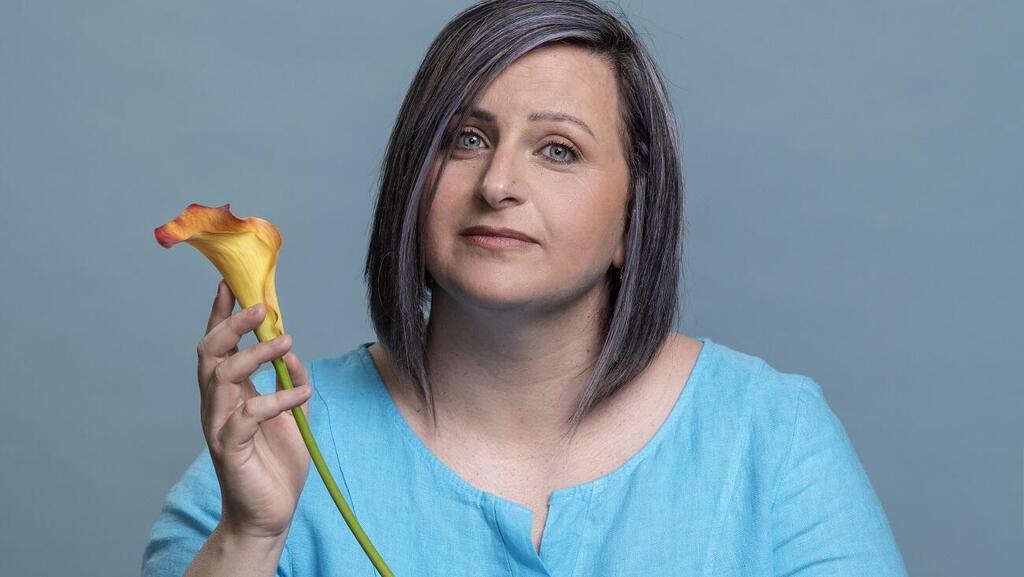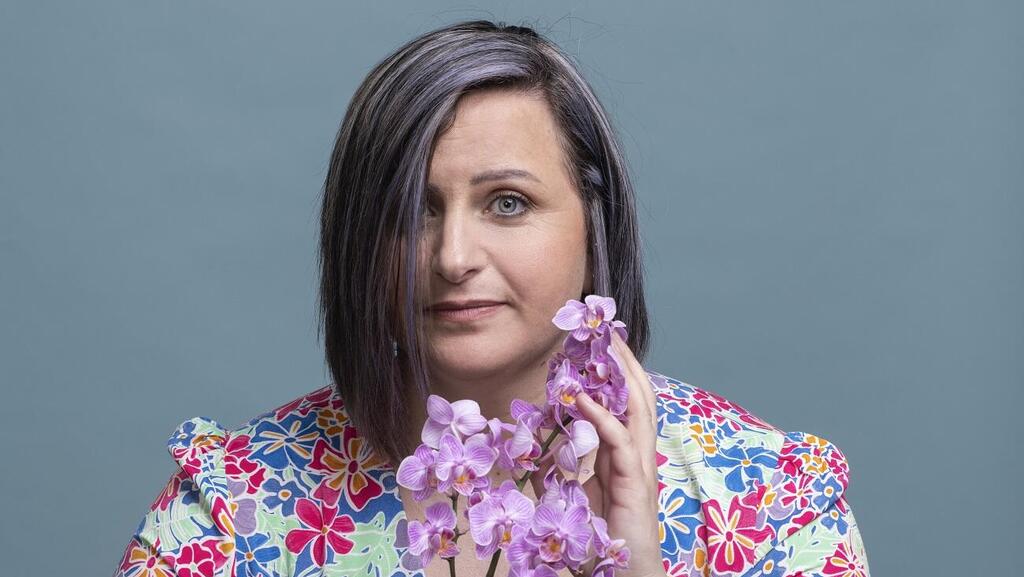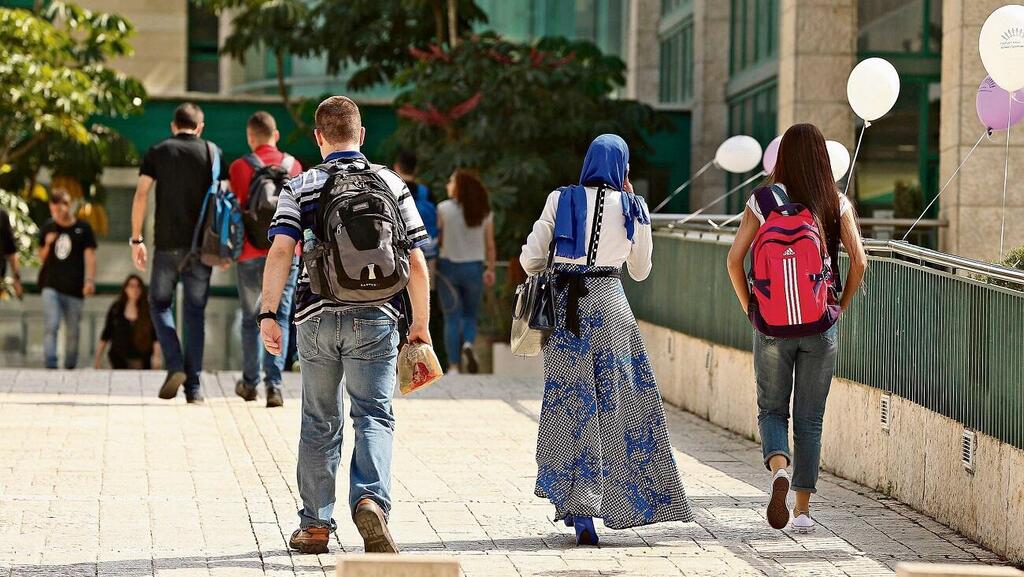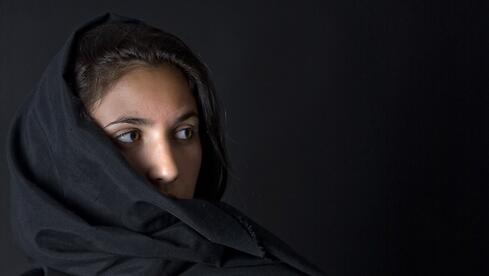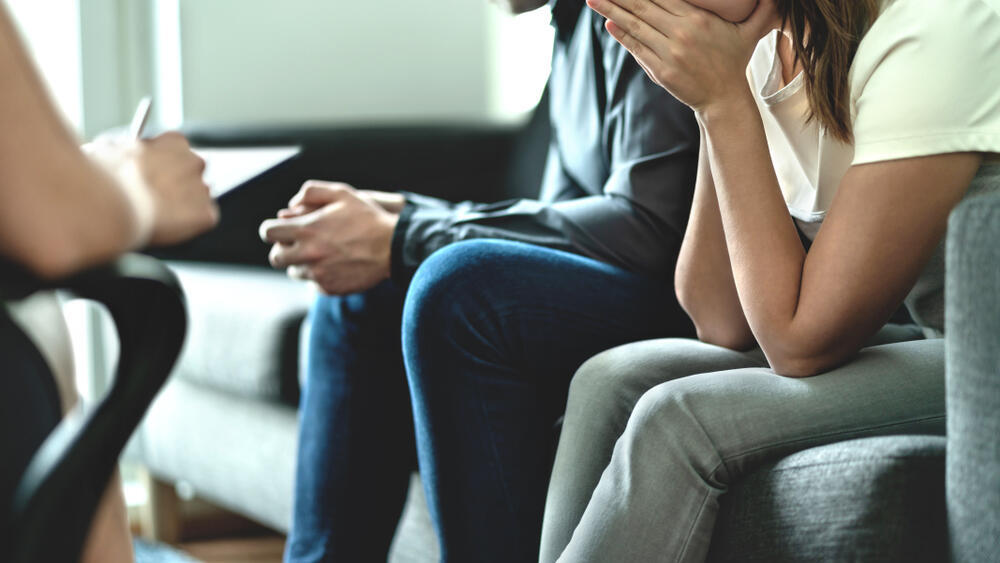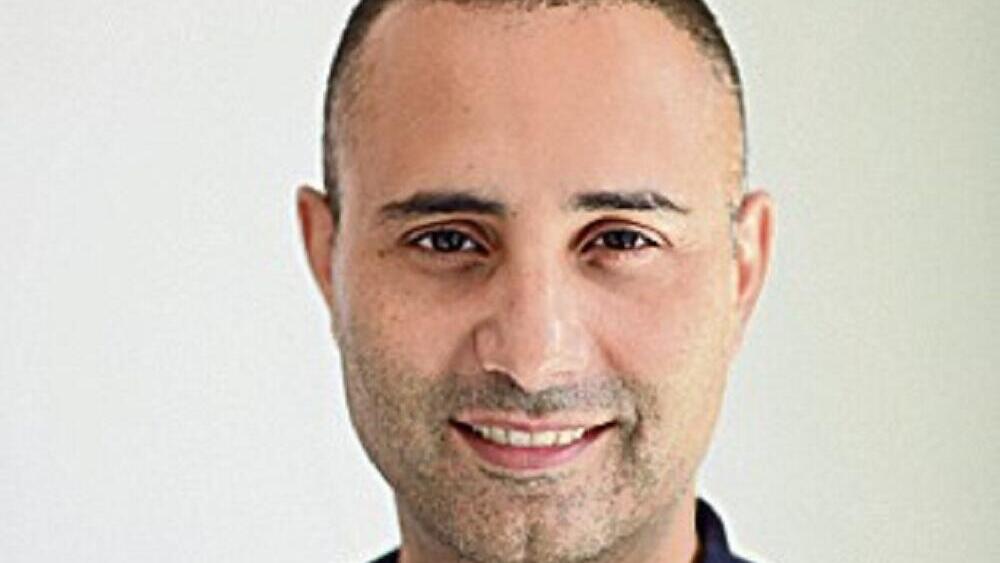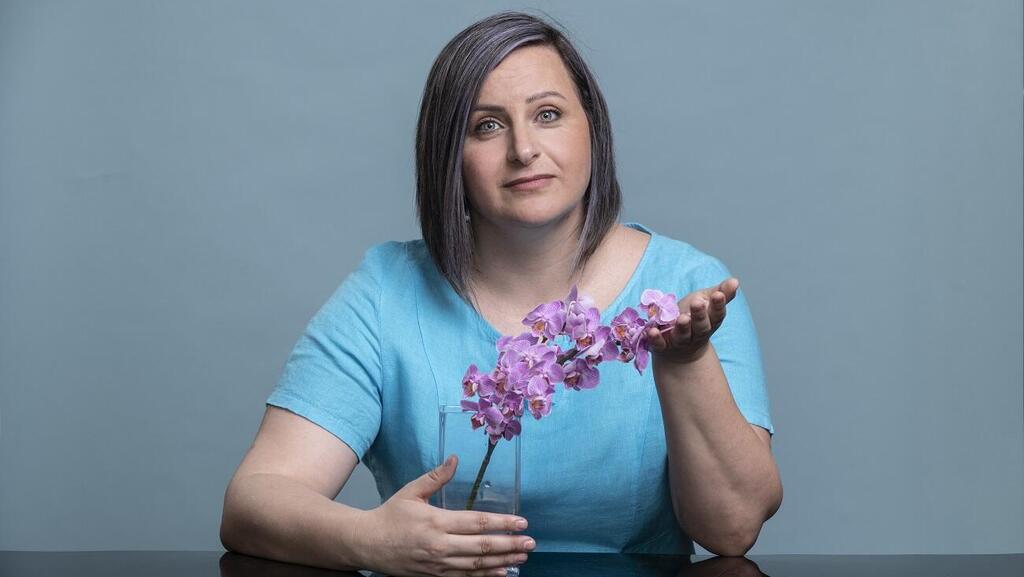Getting your Trinity Audio player ready...
She is 37 years old, single and still lives with her parents in the northern Arab village of Deir Hanna, ten minutes from Karmiel. She spends hours on the country’s roads every day. She’s hasn’t yet started freezing her eggs as she’s well aware of the challenges a Muslim Arab single mother would face.
After completing a Master’s degree in social work, she spent two years studying a sexuality course at Haifa University. After three and half years of training at the Center for Sexual Medicine at Sheba Medical Center, she’s now Israel’s first Arab sex therapist.
"I know it sounds full of contradictions, but in reality it’s much simpler,” Ahlam Ali exclaims, her eyes shining.
What’s simple?
“My name is Ahlam. In Arabic it means 'dream.' I had a dream, and I made it come true. The problems in the Arab and Jewish sectors aren’t so different. We’re all human, flesh and blood. We all deserve to enjoy life.”
And you’ll be everyone’s sex therapist?
“Yes. That’s what I’m aiming for. My next step is opening a clinic in Nazareth. I’m realistic.”
In what sense?
“I’m under no illusions that a Jewish man from Tel Aviv might come all the way for therapy from an Arab woman. That makes no sense. There’s no shortage of sex therapists in the center of the country and everything’s very accessible. On the other hand, if a guy experiencing erectile dysfunction happens to come into my clinic following PTSD from his military service, he might be taken aback by me being Arab. It’s only natural. Too many generations of Israelis have grown up hating each other. I believe that sex, the most intimate aspect of people’s lives, can bring us together.”
How many patients have asked you what an unmarried 37-year-old woman could understand about male sexuality?
“To be honest, I’ve been waiting for that very question. I was sure it would come, but I’ve never been asked about being single. I’d like to believe that it hasn’t come up as patients see me in a professional capacity. I’m realistic though: I think men are so absorbed in their own problems that they just have no headspace for my personal life. Maybe they’d heard me talk about my family and assumed I had a husband and children. I’m interested to see what happens when they have a look at the website and realize I’m single.”
Why do you stay living at home with your parents?
“Over the last decade, a lot of people in the Arab sector have become disconnected from their communities. Young people go off to study in Haifa or Tel Aviv. I can’t afford to rent an apartment and become independent. I’m happy in my family environment. I’m with my parents, nieces and nephews. How would coming home from work to a lovely, rented, empty apartment be better? I like knowing there’s someone’s waiting for me at home.”
Sexuality doesn’t top the list of priorities for Arab women – and definitely not in the case of single women. Ali credits her family for career.
“Although I was raised in a very conservative Arab community, my parents, 64-year-old Amna and Subhi are both nurses.
"My mother works at Tipat Chalav (clinics for babies and infants) and my father works at a facility for people with intellectual disabilities. We’re five brothers and sisters. I’m in the middle. I have two elder sisters: Hi’yam has a teacher’s certificate and manages a dental clinic and Susan is a physical education teacher. My two younger brothers are Hamaada, a metalworker and Waard, a construction engineer. He’s 23 and the two of us have stayed at home.”
She says that her parents always strived for all the children to receive higher education. “From a very early age, I was attracted to therapy. I dreamt of studying psychology, but my psychometric scores [Israel's equivalent of SAT test] meant it was social work. I’ve been working in mental health for twelve years.
"I had two patients who shared with me their sexual problems. I realized that didn’t have any professional answers. The Arab sector has two doctors dealing with sexuality, but there were no sex therapists. My parents were very supportive when I told them I wanted to study sex therapy.”
Just like that?
“It’s obviously very complicated. In Arab society, women marry at about 20. The 'oldest' age is about 28. I was already 31 when I signed up for the course. When I told my mother that I’d also be treating men, she said: 'Reaching out to people who need help is a mission and good deed.' My father wasn’t against it either. I always knew he’d support whatever I chose to do. Our family is a bit unusual in our village – it’s extremely supportive.”
Did becoming a sex therapist appeal to you because, you’d be “the first?"
“Not at all. If I’d have started thinking in terms of being a ‘pioneer’ or a ‘trailblazer’, I think I’d have gotten cold feet and ran away. In Arab society, sexuality only becomes an issue after you get married. I knew people would be asking ‘Wait a minute, what have you got to do with sexuality? ‘I also knew that I would likely to meet stiff opposition from the mufti, the sheikh and other religious officials. It hasn’t happened yet because I’m not really so involved in village life and I’m not active on social media. They didn’t know what I was studying. It’ll be interesting to see how they react when they read this article.”
Are you concerned?
“Naturally. It’s really not accepted. I can already hear them in my mind hurling accusations at me ‘Sexuality is harlotry. It’s immoral.’ I really don’t know what I’ll say to them when they call me in for a talk.”
How many courage pills did you take before deciding to study sexuality?
“None," she smiles. "Luckily, I got into this by chance. The day I went to Haifa University for the license exam for my Master’s degree, I saw an announcement on a notice board reading: ‘Lee and Racheli Reuveni’s first Sexual Therapy course: Registration opening now.’ At that moment, I said myself ‘Go for it.’ The course being in the north of the country made it easier. When I completed the program, I started looking for somewhere to do a residency. I sent off my résumé to a few clinics and the Center for Sexual Medicine at Sheba Medical Center was the first to get back to me.”
Were you surprised?
“I was a rather startled. The center’s director, Dr. Ariel Cohen-Arkin, invited me for in an interview. On the spot, he told me: ‘You’re in.' I didn’t expect it to happen so quickly. I thought I’d have some time to think about it, maybe change my mind. On the other hand, I know myself - too much thinking only creates background noise for me and I didn’t want that to affect my decision. I even took it in my stride travelling five times a week from the north of the country to Ramat Gan for the residency."
She adds: "I reminded myself that pioneers throughout history - in all fields - always knew that their lives wouldn’t be easy. I often felt I was walking a tightrope, navigating between the boundaries set before me and those I wanted to break through. I was afraid that if I broke through the glass ceiling, the broken glass would injure me. Now the Center for Sexual Medicine at Sheba Medical Center has three more Arab sex therapists in various stages of training. I’m happy to have opened up the door for them. There’ll be no shortage of work for them.”
As a child, did you get any kind of sex education?
“Nothing at all. It wasn’t part of the conversation. Neither at school nor at home. Now that my nephews ask my sisters where babies come from, I remember that although I was curious as a child, I never asked anyone that question. I think I must have felt that if I had asked, I wouldn’t have gotten a sensible answer. Maybe they’d have told me stories about storks. In high school, when most of the girls had gotten their first period, a nurse came to class show us how to use sanitary napkins. Heaven-forbid we should know about tampons. Our hymens had to remain intact.”
She’s sad to say that nothing has changed since then. “Although social media has introduced sex into every home, and parents often want to give their children what they didn’t get growing up, no one’s crazy enough to challenge religious laws. I don’t see it being included in the education curriculum and that’s very sad. Sexuality isn’t just about sex and whose is bigger. It’s an inseparable part of a healthy like. This is something that the Arab community hasn’t come to terms with. I see it in the field.”
How?
“Some 90% of Arab women seeking advice at the Center for Sexual Medicine at Sheba complain about Vaginismus, an involuntary and prolonged muscle spasm at the vagina opening preventing penetrative sexual intercourse. Do Arab women suffer from this more than Jewish women? No, but Jewish women come in for advice on how to enjoy sex more. Arab women come just because they’re under pressure to produce children. I generally discover in my first treatment session with Arab women that they have no idea about basic female anatomy. When I begin explaining, they get embarrassed.”
What happens to Arab women after they get married and start having sex?
“Arab society, which has no sex education and doesn’t prepare brides. There’s a huge emphasis on the hymen, the wedding night’s red sheet and family honor. Even your body isn’t really your own. Your body belongs to the whole family and the whole village. If you do anything before your wedding, you’ll be bringing shame on everyone. On your wedding night, you become ‘hallal’ – permitted. You’re married. But how can you put aside everything you’ve been taught and become a sexual being wanting to enjoy sex?”
"Arab women generally come for advice at Sheba after four or five years of marriage, when they’re closed up and can’t even think about penetration. If they’re brave enough to turn to doctors or gynecologists, they generally get useless answers like 'you’re just being difficult.' Women are made to feel guilty. There are doctors who tell men: ‘Don’t give in. She doesn’t have any kind of organic problem. It’s all in her head,' negating the woman’s pain. It’s terrible.”
What bothers Arab men?
“Surprisingly, most Arab men complain about discrepancy in sex drive between themselves and their wives. The men’s sex drive is in decline and they don’t understand what’s going on with their wives who suddenly want more. They don’t see their wives’ sex drive as a compliment or as an expression of love or desire for intimacy, but rather as an insult ('Aren’t I enough for her anymore?'). Their egos and masculinity are hurt and the balance they have built within their marriages is threatened. Arab men are also much shyer than Jewish men. They don’t go off to reserve duty. They’re not used to ‘man-talk’ and they’re not used to sharing their problems.”
So, what do you do?
“During my training, most of the men who came to me would bring their wives along. Even if their problems are physical and organic, they come with their partners – to alleviate the responsibility. They say: ‘It’s her fault. Start by treating her.’ I understand that it’s hard for them to talk openly, so I use high language, not directly connected to sex.”
Such as?
“Instead of asking them what’s going on in bed, I use words from the Quran, so they won’t feel embarrassed. The Quran uses the word ‘al-farj’ for vagina. A ‘libas’ is a garment which helps me explain how the man and woman’s bodies combine to become a single one. When I used language simply copy-pasted from Hebrew, I had no idea how many adjustments I’d have to make so that couples wouldn’t run away. The high language sounds less judgmental and is less of a deterrent. It helps me earn their trust and helps them connect to me for our joint journey of discovery.”
Ali is the first Arab sex therapist to become a member of ITAM (Israeli Society for Sex Therapy). She has also joined the “Middle East Sexual Health Committee” - an international organization of Arab sex therapists.
At first, Ali didn’t believe she’d make it to the end. She recalls: “I was the only Arab at the Center for Sexual Medicine. I had to deal with the finer points of Hebrew, and I felt no one understood me. In group exercises, I felt like a child among adults. The Jewish residents showed up with both sex education and sexual experience. In our community, you don’t live with a partner before the wedding. There were times I felt it wasn’t for me. I was lucky to have two instructors, Galit and Keren, who didn’t give up on me or on the Arab community.”
This is confirmed by Dr. Ariel Cohen-Arkin, director of the Center for Sexual Medicine at Sheba Medical Center. He’s been living with his male partner for 15 years and they have two children. “We’ve seen a lot of change over the past ten years. The LGBTQ community have started coming to us. Haredim too - at their rabbis’ recommendation. We hadn’t managed to make inroads into the Arab community. Shame and preconceptions are sex therapy’s greatest enemies. In my first meeting with Ahlam, I saw a spark in her eyes, a sense of mission and I knew she’d be the one to get it started."
“As I’m the pioneer," Ali says. “No one could have predicted how Jews would react to an Arab sex therapist. I had two or three cases of men who heard my accent, or maybe they saw my name-tag and they got up and left. One was suffering from PTSD resulting from combat service. I wasn’t offended and didn’t take it as a rejection. I understand why Jews prefer Jews and Arab prefer Arabs. People look for people like themselves, especially in times of distress.”
She says that her parents aren’t pressuring her into getting married “because they didn’t have an arranged marriage. They married for love. They were in the same class in high school at the age of 14. They fought for each other until they got married at the age of 22. My mother understands that I also want to marry for love and that I haven’t found the one yet. It sounds like a cliché, but he really hasn’t shown up.”
How do envisage “the one”?
"I don’t have a list. I want him to be clever, but it’s important that it’s not just an intellectual bond. I want to feel something in my heart. When a woman finds the love of her life, the one she wants to have a family with, it’s a miracle, it’s fate. It’s in God’s hands. It doesn’t matter what you call it. “
Is it better for a 40-year-old Arab woman in Israel to be single or divorced?
“In the Arab sector, there’s been an enormous shift in attitudes towards women in recent years, at least in the north of the country, where we have sub-sectors - Druze, Caucasians and Christians. This diversity makes us a little less conservative. Here, divorced women are much more accepted."
She adds: "The stigmas haven’t disappeared though. If you’re a single 40-year-old woman, you’re probably arrogant or fussy. There’ll always be a neighbor telling you that you should just get married like everyone else. I haven’t been on a date in years. I’ve been focusing on my studies and getting licensed. It’s not as if I’ve deliberately not been looking for a partner. It’ll be interesting to see what’ll happen now that I’m out of excuses.”
Why haven’t you frozen eggs?
“Because I haven’t decided yet. In the Arab community, a sperm bank or being a single mother is out of the question. Islam forbids it and I accept the rules. In a village next to Dier Hanna, there’s a Christian Arab woman who had a child using a sperm bank. She’s raising him on her own. She’s paying the price by being treated as a social outcast. If she were Muslim, I assume the price would be higher.“
Do kind souls keep reminding you about your biological clock?
"Right now, I’m ignoring whatever they’re saying. Some women know what they want to study and who they want to marry from an early age. That’s not me. I’m still at the 'Becoming a mother: Yes/No' stage. I don’t see motherhood as necessarily synonymous with happiness. My life is rich and exciting. If I get to 40 and I’m no longer fertile. I’ll be happy with all the decisions I’ve made. This is my truth.”
Ali, who has proven that you can make your dreams come true, sees the glass half-full: “My wish is that one day, Arab women come in for treatment seeking better sexual satisfaction. If only they learnt how to be more open and learn how to use a vibrator. If only Arab men understood that their job is to satisfy their wives, not just impregnate them. “
And what do you wish for yourself?
“To never be afraid.”


